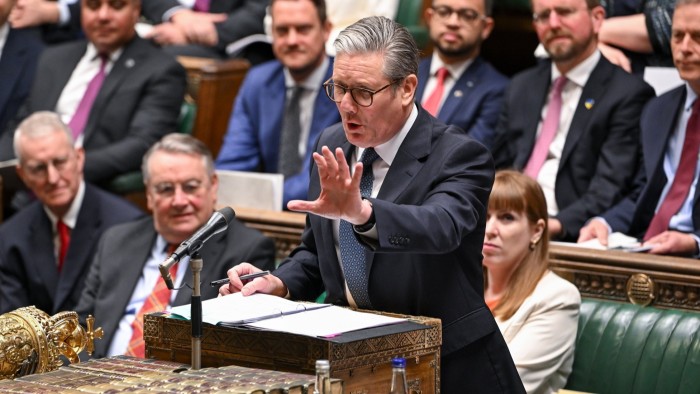Britain has launched a consultation with business about possible retaliation against US tariffs, as ministers warned that the country could hit back if Donald Trump does not agree a trade deal in the coming weeks.
Jonathan Reynolds, business and trade secretary, launched a formal four-week review on Thursday of what reprisals might be taken — and what products might be targeted — if the UK and US fail to agree a deal to cut US tariffs.
Sir Keir Starmer told business leaders he would redouble efforts to secure a trade deal with the US after early negotiations failed to stop Trump slapping a 10 per cent tariff on all British exports.
There are serious concerns in Downing Street about the impact on the UK economy of a breakdown in global trade, as well as the hit to Britain’s car and steel exporters, which are facing tariffs of 25 per cent.
Reynolds said he would continue with “calm” negotiation and hoped trade retaliation would not be necessary. “While some urge escalation, I simply won’t play politics with people’s jobs,” he said.
The business secretary told MPs he wanted a trade deal to “avoid what was announced last night”, although some British officials warn it will be tough to persuade Trump to cut his 10 per cent baseline tariff on the UK.
Reynolds suggested his top priority was to cut the 25 per cent tariff on UK car exports to the US: “That is a particular concern to me,” he said.
The IPPR think-tank estimated that 25,000 direct jobs in the car industry could be at risk, with employees at Jaguar Land Rover and Mini seen as most exposed.
Reynolds announced a “request for input” from business on possible retaliatory sanctions, in which he asked companies to comment on likely outcomes if tariffs were imposed on certain US imports to Britain.
He published a list of product lines — amounting to 27 per cent of imports from the US — as potential targets. The aim is to find potential retaliatory tariffs that cause as little damage as possible to the UK economy.
Along with traditional targets such as motorbikes, whiskey and denim, the list of 8,364 product lines also includes items such as live eels, human hair, sewage sludge, frozen bovine tongue and live camels.
Business leaders have expressed reservations about retaliatory action. Make UK, the manufacturing lobby, and the CBI employers’ group, both warned on Thursday against an escalating “trade war”.
Starmer and Reynolds believe Trump will ultimately do a trade deal. Reynolds said the consultation with business would be suspended if a deal was agreed with the EU before it closes on May 1.
There was some relief in Downing Street that Britain was subject to the lowest tariff imposed by Trump on Wednesday, half the 20 per cent levy on EU exports.
But the tariffs are still likely to cost thousands of jobs across the UK, and eat into the financial headroom set aside by chancellor Rachel Reeves to meet her fiscal rules.
If the UK’s economy is knocked off course by the trade war, the chancellor may be forced to raise taxes or cut government spending later in the year.
Stephen Phipson, chief executive of the manufacturers’ group Make UK, said Trump’s tariffs announcement was “devastating for UK manufacturing”.
Scotland’s deputy first minister Kate Forbes also warned that a 10 per cent tariff could cause £200mn-£400mn of losses to the Scotch whisky industry, which sells about £1bn of exports to the US each year.
Starmer faces political danger if he is perceived as refusing to stand up to Trump, when allies such as the EU and Canada are fighting back with retaliatory tariffs.
The fact that Trump has handed Britain a more favourable tariff rate than the EU could also create tensions with Brussels at a time when the UK prime minister is trying to “reset” post-Brexit relations.
The prospect of the EU imposing retaliatory tariffs on the US but the UK refusing to do so throws up a further problem for Starmer: the fallout for Northern Ireland and its sensitive post-Brexit settlement.
Recommended
The region, which has remained in the EU’s single market for goods under a post-Brexit trading deal, is also part of the UK customs territory and is subject to a complex web of trading rules.
The 10 per cent baseline tariff was also applied to many other countries and largely reflected Britain’s balanced trading relationship with the US, rather than the recent trade talks.
Nevertheless, Downing Street claimed that the prime minister’s diplomacy with Trump had saved thousands of jobs. “We don’t want any tariffs at all, but a lower levy than others vindicates our approach. It matters because the difference between 10 per cent and 20 per cent is thousands of jobs,” said a Number 10 official.
The outline for the US-UK trade deal currently on the table in Washington includes Britain offering to dilute or scrap its digital services tax and a reduction on some meat and seafood tariffs.
Lord Peter Mandelson, Britain’s ambassador to the US, is also pursuing a parallel track aimed at securing a tech agreement with Washington that would involve closer co-operation in areas such as artificial intelligence and space.



